 More Days at the Morisaki Bookshop (Days at the Morisaki Bookshop, #2) by Satoshi Yagisawa, Eric Ozawa
More Days at the Morisaki Bookshop (Days at the Morisaki Bookshop, #2) by Satoshi Yagisawa, Eric Ozawa Narrator: Catherine Ho
Format: audiobook, eARC
Source: purchased from Amazon, supplied by publisher via Edelweiss
Formats available: paperback, large print, ebook, audiobook
Genres: books and reading, literary fiction, relationship fiction, world literature
Series: Days at the Morisaki Bookshop #2
Pages: 176
Length: 5 hours and 21 minutes
Published by Harper Perennial, HarperAudio on July 2, 2024
Purchasing Info: Author's Website, Publisher's Website, Amazon, Barnes & Noble, Kobo, Bookshop.org, Better World Books
Goodreads
In this charming and emotionally resonant follow up to the internationally bestselling Days at the Morisaki Bookshop, Satoshi Yagisawa paints a poignant and thoughtful portrait of life, love, and how much books and bookstores mean to the people who love them.
Set again in the beloved Japanese bookshop and nearby coffee shop in the Jimbocho neighborhood of Toyko, More Days at the Morisaki Bookshop deepens the relationship between Takako, her uncle Satoru , and the people in their lives. A new cast of heartwarming regulars have appeared in the shop, including an old man who wears the same ragged mouse-colored sweater and another who collects books solely for the official stamps with the author’s personal seal.
Satoshi Yagisawa illuminates the everyday relationships between people that are forged and grown through a shared love of books. Characters leave and return, fall in and out of love, and some eventually die. As time passes, Satoru, with Takako’s help, must choose whether to keep the bookshop open or shutter its doors forever. Making the decision will take uncle and niece on an emotional journey back to their family’s roots and remind them again what a bookstore can mean to an individual, a neighborhood, and a whole culture.
My Review:
At the end of the first book, Days at the Morisaki Bookshop, it seems as if life is on the upswing for first-person narrator Takako, her eccentric uncle Satoru, and his used bookshop in the Jimbocho neighborhood of Tokyo, a place that is positively chock full of used book stores.
As this second book opens, life seems to be going well for Takoko. She’s moving forward with her life, has a job that she enjoys, a solid and happy and solidly happy romantic relationship, her uncle is happily complaining – which is his way – her aunt seems to have made peace with her uncle and their relationship seems stable and happy.
Even the bookshop seems to be doing well.
Howsomever, just as the first book started out as sad fluff, with Takoko in the depths of depression and eventually working her way out through working at the bookshop, rekindling her childhood closeness with her uncle, rediscovering the joys of reading and slowly becoming involved with the life of the neighborhood, these “more days” at the bookshop transit the path in the other direction.
At the beginning, all seems to be well. But as Takoko observes each time she returns to the bookshop to spend time and help out – the reality is that happiness is slipping out from under them.
Some parts of the various situations can be fixed – but not all of them. And not the saddest of all.
 Escape Rating A-: I picked up More Days at the Morisaki Bookshop because, having fallen in love with the first book, Days at the Morisaki Bookshop, I wanted more, well, days at the Morisaki Bookshop.
Escape Rating A-: I picked up More Days at the Morisaki Bookshop because, having fallen in love with the first book, Days at the Morisaki Bookshop, I wanted more, well, days at the Morisaki Bookshop.
And that’s exactly what I got – and it was beautiful. I’m very glad that I read it – or rather that I gave in to temptation and listened to Catherine Ho as the voice of Takako again because she does an excellent job of embodying the character.
Like the previous book, this is not a story of great doings and big happenings. It’s a quiet story, a book of slices of life, specifically the lives of Takako, her family, her friends, and the Morisaki Bookshop which so much of those lives revolve around.
But, and this is a bit of a trigger warning, the progression of this story is the opposite of the first. It starts high and ends low – even though the epilogue does a good job of letting the reader know that life moves on – even from the depths of grief.
Howsomever, the depths of that grief are very deep indeed. Especially in the excellent audio recording, where it feels as if it’s Takako’s voice telling you just how heartbroken so many of the characters are. It’s very effective, and very affecting. Readers who are already grieving someone close to their hearts will find that part of the story gut-wrenching, cathartic, or both – as this reader certainly did.
 So maybe don’t listen to that part while you’re driving because the urge to cry right along with Takako is pretty much irresistible.
So maybe don’t listen to that part while you’re driving because the urge to cry right along with Takako is pretty much irresistible.
That being said, the whole thing is lovely and charming and filled to the brim with the joy of books and reading and the people who love both – just as the first book was. I’m as happy I read this second book as I was the first – even if it did leave me a bit weepy.
This series, along with Before the Coffee Gets Cold, The Kamogawa Food Detectives, What You are Looking For Is In the Library, The Dallergut Dream Department Store and the upcoming We’ll Prescribe You a Cat are part of a marvelously charming and extremely cozy trend of magical – sometimes with real magic – comfort reads and I’m enjoying it tremendously.
If you’re looking for some cozy, comforting reads, you might want to snuggle up with some of these books too!

 Summers End (A Shady Hollow Mystery, #5) by
Summers End (A Shady Hollow Mystery, #5) by 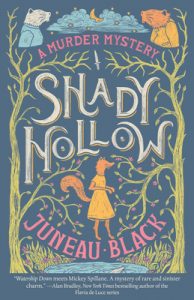 All the characters in Shady Hollow are animals. Which doesn’t mean that they aren’t people – because they absolutely are. Even if, or especially because, their species and its characteristics allows the story to overtly display certain facets of their personalities that have to be revealed a bit more obliquely in, let’s call them more traditional, cozy fantasies.
All the characters in Shady Hollow are animals. Which doesn’t mean that they aren’t people – because they absolutely are. Even if, or especially because, their species and its characteristics allows the story to overtly display certain facets of their personalities that have to be revealed a bit more obliquely in, let’s call them more traditional, cozy fantasies.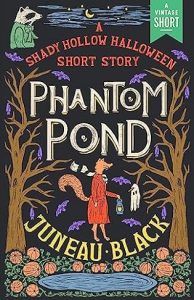 Escape Rating A-: This series has always struck me as being a bit of the case of the bear dancing – and pardon the pun about Orville Braun. But seriously, although the series NEVER takes itself too seriously, the whole thing has always struck me as something that one is not surprised is done well but that it’s done AT ALL.
Escape Rating A-: This series has always struck me as being a bit of the case of the bear dancing – and pardon the pun about Orville Braun. But seriously, although the series NEVER takes itself too seriously, the whole thing has always struck me as something that one is not surprised is done well but that it’s done AT ALL. Murder at the White Palace (Sparks & Bainbridge, #6) by
Murder at the White Palace (Sparks & Bainbridge, #6) by 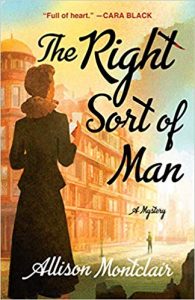 Over the course of the
Over the course of the 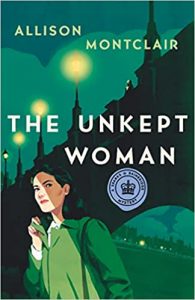 Escape Rating A+: I was up until 3 am finishing this, so an A+ it most definitely is. I tried telling myself I could finish AFTER breakfast, but myself wasn’t listening. I simply HAD to find out whodunnit!
Escape Rating A+: I was up until 3 am finishing this, so an A+ it most definitely is. I tried telling myself I could finish AFTER breakfast, but myself wasn’t listening. I simply HAD to find out whodunnit!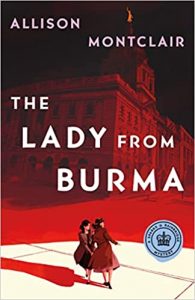 But the case itself isn’t so much about Archie as it is about Archie poking his nose in places that it doesn’t belong. It’s about the past – and not even Archie’s own. While Archie is fighting for his life in the hospital, and Iris Sparks is emotionally flailing about the potential loss of a future she wasn’t sure that she wanted until it was nearly snatched out of her hands – it’s up to Gwen Bainbridge to get to the bottom of the case that literally dropped on her head.
But the case itself isn’t so much about Archie as it is about Archie poking his nose in places that it doesn’t belong. It’s about the past – and not even Archie’s own. While Archie is fighting for his life in the hospital, and Iris Sparks is emotionally flailing about the potential loss of a future she wasn’t sure that she wanted until it was nearly snatched out of her hands – it’s up to Gwen Bainbridge to get to the bottom of the case that literally dropped on her head. The Dallergut Dream Department Store by
The Dallergut Dream Department Store by  In short, The Dallergut Dream Department Store is utterly charming, and I was absolutely charmed – even in the places where I had to tell the logical side of my brain to go to sleep and just dream the whole thing.
In short, The Dallergut Dream Department Store is utterly charming, and I was absolutely charmed – even in the places where I had to tell the logical side of my brain to go to sleep and just dream the whole thing. Earthlight by
Earthlight by  I NEED a text so I can hunt for quotes AND have a full list of characters, how their names are spelled and who played them in the audio. Because the cast was outstanding – every single one.
I NEED a text so I can hunt for quotes AND have a full list of characters, how their names are spelled and who played them in the audio. Because the cast was outstanding – every single one. The Price of Redemption (Tides of Magic, #1) by
The Price of Redemption (Tides of Magic, #1) by  But one of the most respected AND popular ‘spin offs’ from this particular war is the
But one of the most respected AND popular ‘spin offs’ from this particular war is the  This Great Hemisphere by
This Great Hemisphere by  Penric and the Bandit (Penric and Desdemona #13) by
Penric and the Bandit (Penric and Desdemona #13) by 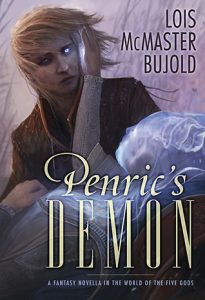 Learned Divine Penric kin Jurald of Vilnoc is ALWAYS the single most dangerous person in the room in any situation because of his magic, his demon Desdemona, and the favor of his god, the Lord Bastard – and has been since the very first novella in this series,
Learned Divine Penric kin Jurald of Vilnoc is ALWAYS the single most dangerous person in the room in any situation because of his magic, his demon Desdemona, and the favor of his god, the Lord Bastard – and has been since the very first novella in this series,  Escape Rating A: After the previous entry in this series, the rather cozy and close to home
Escape Rating A: After the previous entry in this series, the rather cozy and close to home  The Mummy of Mayfair (An Irregular Detective Mystery #2) by
The Mummy of Mayfair (An Irregular Detective Mystery #2) by 
 Guard the East Flank: a military romantic suspense (Night Stalkers Reload Book 1) by
Guard the East Flank: a military romantic suspense (Night Stalkers Reload Book 1) by  Lieutenant Colonel Emily Beale was a legend among the Night Stalkers. And so she should be, considering her many, many firsts and achievements and successful missions. (If you want details – and you should if you love military romance! – check out the original
Lieutenant Colonel Emily Beale was a legend among the Night Stalkers. And so she should be, considering her many, many firsts and achievements and successful missions. (If you want details – and you should if you love military romance! – check out the original  I’ve been a fan of this author since I read the very first
I’ve been a fan of this author since I read the very first